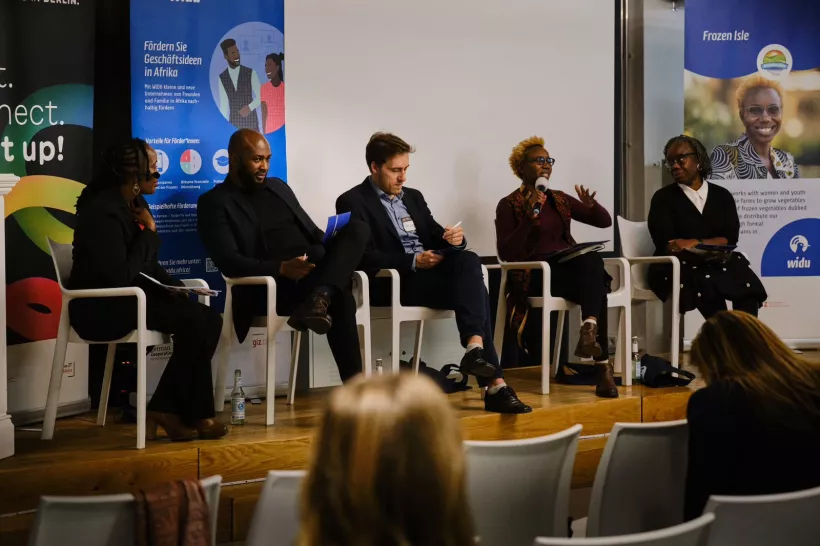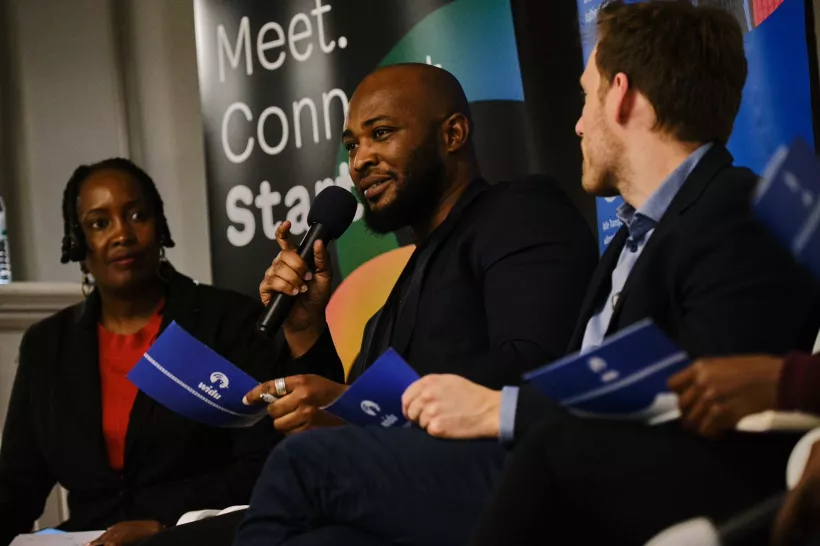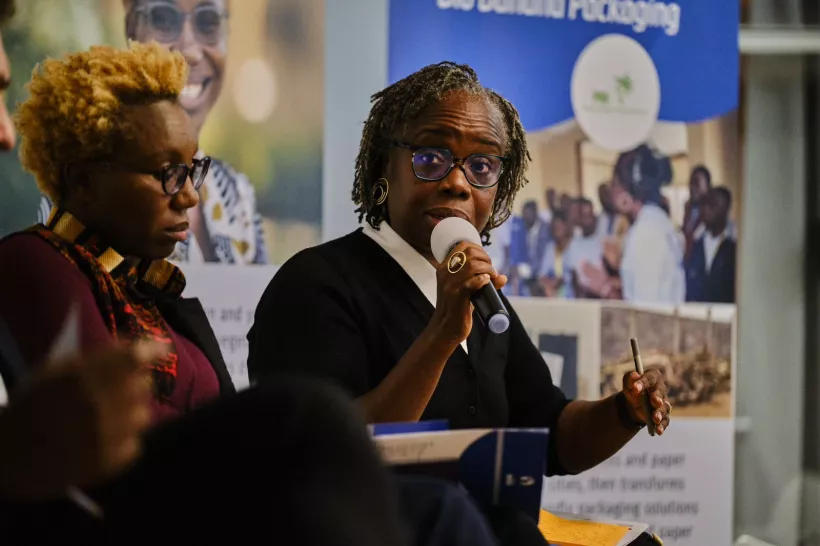Experts discussed financing and training options for African micro and small enterprises (MSMEs) and what role the African diaspora can play in this.
On 22 November, WIDU.africa hosted the panel discussion "Enhancing Access to Finance and Skills for African SME's together with the African Diaspora" in Berlin during the Make-IT in Africa Africa Start-up Connect Week. During the exchanges, expert, practitioners as well as an African entrepreneur from Kenya discussed challenges faced by African entrepreneurs and brainstormed on practical solutions for resilient and productive MSMEs in Africa. Among other things, the panelists discussed the options available to African entrepreneurs to finance their business ideas, as well as the challenges associated with the individual options. Another key take away has been the emphasis on the importance and potential of leveraging financial and social diaspora remittances in this context.
Vivid presentation from the world of entrepreneurship

Entrepreneur Florence Mogere opened the panel discussion and described the challenges she has faced throughout her career. "Supermarkets finally wanted to sell my products - that's when I encountered the issue of bureaucracy," she recalls. Documents were complicated to fill out and the process took a long time. "It wasn't easy for me as a young entrepreneur." Money was also an issue, especially convincing investors of her business idea Frozen Isle. Ultimately, Florence benefited from her participation in WIDU.africa. She was able to purchase the equipment she needed for her business with the help of a diaspora remittance from her diaspora donor.
Either diaspora or bank loan? Financing options for African MSMEs

Emmanuel Nomafo expert on linking MSMEs to funding and markets, focused on the topic of access to debt finance for MSMEs. African entrepreneurs face key challenges such as 1) Limited credit offerings to smaller firms, priority is given to large borrowers, 2) High-interest rates which make the cost of credit high and prohibitive, 3) High requirements on collateral usually in the form of fixed assets (lands or buildings) due to high perceived risk of lending, 4) Complex application processes such as undergoing rigorous feasibility checks and minimum deposits requirements, and 5) Loan repayment tenors that are shorter than what a “WIDU-type” of business’s cycle would require. Banks, on the other hand, face 1) a lack of reliable information on the entrepreneur, 2) a missing business case for the “missing middle”, and 3) high risks due to possible credit defaults. The latter is not only about the quality of the business or the collateral but also about the risk of the entrepreneur applying for several loans from different institutions at the same time (double lending) and thus risking over-indebtedness. National Credit Reference Offices (CROs) who could centrally collect and cater to banks and (borrowers too) with neutral information about the creditworthiness of the borrower, like the Schufa in Germany, are either non-existent or under-resourced."
“Of course, we also recognise these challenges that African MSMEs face”, explains Georg Koeppinghoff from WIDU.africa: "WIDU may be the solution to bring the supported entrepreneurs closer to the market, but we want to go one step further in our second phase: That's why we are working towards implementing a cooperation with African banks in the second phase of the WIDU.africa project.” The idea: WIDU provides user data and in return the companies receive subsidised loans from the banks, a kind of follow-on financing for which companies can qualify if they have already participated in the project three times.
Economic framework conditions need to change

Mavis Owuso-Gyamfi, who works for the ACET think tank, focused on an overarching issue that nevertheless has a major impact on the development of MSMEs in Africa. Using the example of cocoa production, she described this challenge: "Isn't it mind-boggling that African countries export all the raw materials for the production of chocolate to countries like Switzerland, and that this chocolate only ends up back on supermarket shelves in African countries as ready-produced chocolate bars?" In order for the entire production process to take place in Africa, simplified trade between African countries would be necessary to enable imports of chocolate raw materials within the continent. The creation of African centers of excellence that specialize in certain production steps is also a possibility, according to her.
Panel discussion against the backdrop of an international conference
The well-attended panel discussion took place as part of the Make-IT in Africa Start-up Connect Week and the G20 Compact with Africa conference and aimed to emphasize both the challenges faced by micro-enterprises in Africa and their immense importance for African economies and to discuss possible solutions. WIDU also invited three companies from Cameroon, Ghana and Kenya, among others, who were given the opportunity to discuss their ideas with other entrepreneurs and present them to Olaf Scholz and Svenja Schulze, Federal Minister for Economic Cooperation and Development.